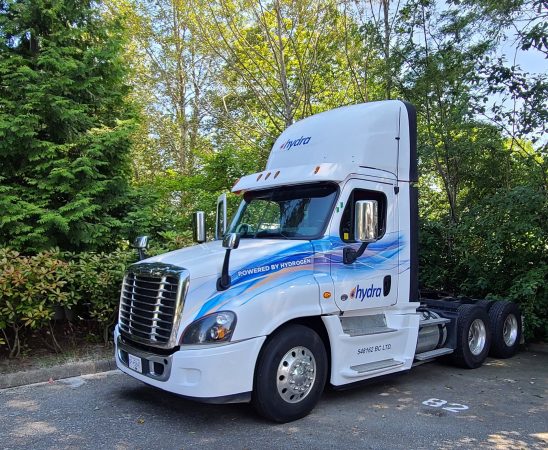
Hydra Energy’s manufacturing propelling conversion of diesel fuel to hydrogen energy
by Sadi Muktadir

Hydra Energy is currently using data to tackle the problem of how long it's taking to convert diesel trucks to hydrogen-fuelled ones.

Hydra Energy’s hydrogen injection technology powers heavy-duty trucks with waste green hydrogen that would normally be vented into the atmosphere.
Hydra Energy has big plans for 2022. The cleantech manufacturer of hydrogen conversion kits is currently operating in Northeastern B.C., converting diesel fuel trucks to hydrogen-based vehicles for decreasing emissions and reducing the carbon footprint. Earlier in the year, the province of B.C. also announced Low Carbon Fuel Standard credits (LCFS) valued at $1.9M to build a hydrogen fuelling station in the region to support Hydra Energy’s efforts.
When asked how the conversion kits worked, Jessica Verhagen, CEO of Hydra Energy was clear in explaining its simplicity.
“Our conversion kit is installed onto Class A trucks, and it involves tanks of hydrogen, piped into the kit, and then its injected into the engine chamber,” Jessica says. “We’re up to 40% hydrogen displacing the diesel used in the combustion process.”
According to Jessica, part of Hydra’s success is due to its reliance on its own proprietary technology, and an emphasis on advanced technologies as a solution to convert diesel trucks to hydrogen energy.
“Our ECU (engine control unit) is our proprietary technology, and this computer gets installed onto a converted truck to collect data. The computer collects data from 200 different sensors on the truck to determine the best point in time to inject hydrogen to get the most fuel efficiency.”
Hydra is now looking beyond their ECU technology to improve their business. Jessica sees Hydra as more conducive to new technologies because they’re already in an industry that’s new and innovative, working with old diesel-based trucks to turn them into a lower-emission vehicle that meets Canada’s climate goals.
With this in mind, Hydra Energy is currently using data to tackle the problem of how long it’s taking to convert diesel trucks to hydrogen-fuelled ones. Their ECU’s data records the different types of trucks it is being installed on, the efficiency of the hydrogen fuel, and how smooth the trucks are running, and is able to provide that data for future conversions, optimizing the process.
“We’re using the data that we’re gathering, to predict what future models of trucks we’ll need, and to decrease on our conversion times. The data forms a pool for our machine learning operations, so we can use it in a predictive analytics way to determine what future trucks will need to be designed for to optimize its hydrogen fuel capabilities.”
Hydra Energy will be converting 65 trucks with plans for more, and has a planned feasibility study wrapping up in October of 2021. The study will hope to help Hydra understand how much funding they will need for their future infrastructure plans, among other things. They also have the rights to three more planned fuelling sites, with one more in B.C., one in Manitoba and one in Quebec.
As hydrogen hubs and fuel technology picks up steam, advanced technologies and investments in Industry 4.0 tools will continue to help manufacturers grow their business, as Canada aims to be a Cleantech leader in 2022 and beyond.